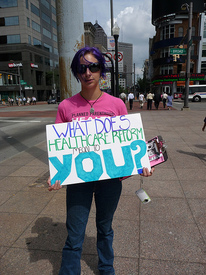
The problem is that before President Obama’s moving closing remarks in his recent address to the joint session of Congress, this one big question has not been at the heart of our nation’s health care debate. At least on the progressive side.
The right-wing movement figured out a long time ago that most Americans make their political decisions not on facts, figures and fine points of policy but on personal values and fundamental beliefs. Progressives might think the other side is absolutely nuts with their references to “right to life” and “death panels,” but right-wing leaders know that these phrases evoke the emotional response and establish the moral framework that attracts many Americans to their side and stirs them to action.
As political phrases, “public option” and “single payer” fail to elicit that same response.
Up until now, the health care reform movement has focused so much on facts and figures that even our most ardent supporters’ eyes glaze over. Health care as a moral issue and human right may be one of many talking points, but it is never the primary one.
Today’s movement is pretty much following in Bill Clinton’s footsteps of 1993 in how to frame the health care debate. In his first State of the Union address, he spoke in terms of health care reform as a key element in “our efforts to strengthen the economy.”
“Over the long run, reforming health care is essential to reducing the deficit and expanding investment,” he said.
At this same time in Taiwan and Switzerland, efforts were under way to reform their health care systems, as well.
In Taiwan, though, where 60 percent of the citizens were not covered by health insurance, the Democrats there emphasized that “on a moral level, a prosperous country like Taiwan had a basic ethical duty to provide access to medical care for all its people,” reported T.R. Reid in his book, “The Healing of America.”
In July 1994, while the Clinton plan couldn’t get out of congressional committee, Taiwan’s National Health Insurance passed, and by March 1995 the NHI began offering universal coverage modeled after Canada’s single-payer system.
In Switzerland, where only 5 percent of the country’s citizens were without health care insurance, the unions, farmers and liberal parties argued that “universal health care should be an essential element of Swiss solidarity,” wrote Reid.
“Americans love to invoke freedom and independence while Swiss constantly talk about solidarity, community, equal treatment and ‘despite all our differences, we’re all in this together’,” he wrote.
By national referendum vote, Switzerland, the home base of many of the world’s largest insurance companies, created a multi-payer, 70-plan universal health care system where health insurers were forced, by law, to operate as nonprofit entities whose role is collecting government-regulated premiums, offering government-regulated basic benefits, and paying out all doctor and hospital claims within five days without denials according to strict government regulation.
In his study of health care systems around the world, Reid interviewed Professor William Hsiao, a Harvard economist who understands the financing and delivery of health care, having designed successful systems in more than a dozen countries.
“Before you can set up a health care system for any country, you have to know that country’s basic ethical values,” Hsiao told Reid, “If the people believe that medical care is a basic right, you design a system that means anybody who is sick can see a doctor … Your ethics, your sense of justice, determines how you distribute goods and services, including health care.”
So while many decisions have to be made in creating a health care system – political, economic and medical – the primary decision to be made is a moral one, Reid concludes.
We have yet to see a national debate on the morality of universal health care take place here. Fortunately, it is not too late for the American health care reform movement to seize the moral high ground from the right.
The president’s closing remarks to Congress serve as a model for the movement to emulate in how to talk to Americans about health care. They should be e-mailed far and wide. Better than anyone on the national scene, President Obama understands American values and culture. Yes, we are the land of rugged individualism and fierce devotion to freedom, but we are also the land of compassionate and caring people who hold dearly the belief that government exists to insure life, liberty and the pursuit of happiness. It then makes sense to raise the question, “So how can there be a right to life without a right to the health care that sustains life?”
These values are not Republican or Democratic, the president reminds us. They are American values. They are part of our character as a nation and they include “our ability to stand in other people’s shoes. A recognition that we are in this together; that when fortune turns against one of us, others are there to lend a helping hand.” These are the words that stirred Americans that night.
Therefore, health care reform is not just another piece of legislation that will cost us more money. It will define who we are as a people. Universal health care will not be just another drain on the national treasury. It will be one of our national treasures, something we can hold up with pride to show the whole world and tell them, “This is what America is about. This is what we believe in.”
Sam Stark is a UAW retiree in Michigan.










